Iran General Says ‘Rioters Linked To CIA’ Arrested During Protests
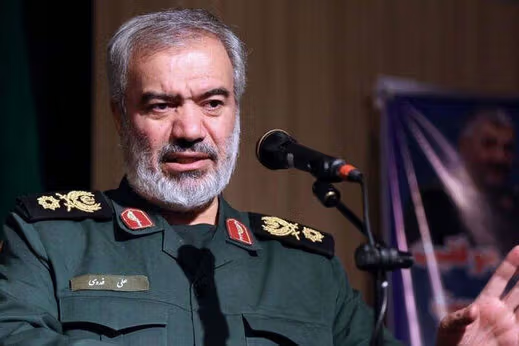
A top Revolutionary Guard commander claimed Tuesday that several people have been arrested during Iran’s “riots” were in touch with US intelligence agencies.

A top Revolutionary Guard commander claimed Tuesday that several people have been arrested during Iran’s “riots” were in touch with US intelligence agencies.
Iranian officials use term “riot” to describe the nationwide antigovernment protests.
Deputy commander of the IRGC Ali Fadavi said those arrested were not only in touch with “Iran International [TV], which is a branch of the enemy's spy services, but also were related to the intelligence and spy services of the United States.”
Iranian officials are frustrated that foreign-based satellite television such as Iran International and BBC Persian beam independent news and views on the ongoing protests. They have also virtually shut down access to the internet to restrict the flow of information.
He made the remarks on Tuesday during a meeting of IRGC commanders but did not provide any evidence to back up his claims.
Last week, Fadavi stated that anti-government unrest in Iran persists because there are protesters who have been “deceived”, presumably by foreigners.
“The IRGC tried to appease and put up with those who were deceived and joined the protests, and that is the reason why the unrest has not ended, otherwise it would not have lasted more than six days,” he had said.
“Deceived” is a term that Ali Khamenei, the Supreme Leader of the Islamic Republic, has used many times to describe the people, especially the young protestors in the streets, emphasizing that the unrest is staged by “foreign enemies.”
Other officials have been repeating Khamenei’s allegations that foreign countries and conspiracies were behind fomenting the protests.
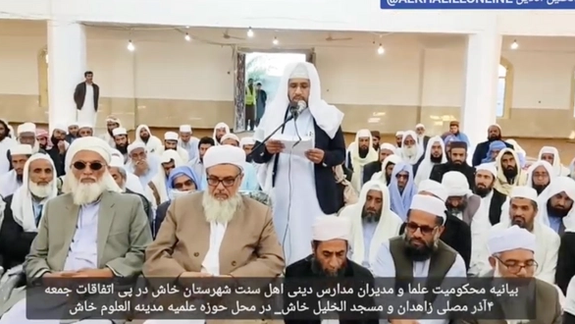
A group of Sunni religious leaders in several Baluch cities across Sistan-Baluchestan province called on the Islamic Republic to stop its repression machinery used against protesters.
In a joint video statement released on Monday, Friday prayer Imams and religious scholars from Khash, Taftan, Mijaveh and their neighboring towns decried the regime’s appalling attacks against the people of Kurdish majority cities, the killings on September 30 dubbed as ‘Bloody Friday’ in Zahedan, and a brutal crackdown of Khash residents on November 4, among others.
Protesting Islamic Republic’s violations of human rights and dignity, they said religious leaders, elders and intellectuals in the province with a unified voice condemn government’s violent reaction to protests across the country and show their “national solidarity.”
The clerics said the attacks against the people at the Grand Makki Mosque -- the largest Sunni mosque in Iran located in the center of Zahedan – and Al-Khalil Mosque in Khash, where security forces arrested many people, and similar incidents across the province are aimed at fomenting fear among the people to dissuade them from attending prayers at mosques. They denounced the strategy by the Islami Republic as “Mosquephobia,” apparently because the mosques are places where Sunni people gather to listen to their community leaders criticize the regime.
The signatories of the statement also called for "the release of all political prisoners in Iran, who were arrested during the recent protests." Noting that peaceful protest is the people's right, they also urged the authorities to address issues regarding women's rights. “The voices of the Iranian people should be heard," they added.
Emphasizing that the relentless ethnic and religious discrimination that has persisted over four decades of the Islamic Republic, the Sunni clerics expressed support for “the wise positions” of Mowlavi Abdolhamid as the serious and legitimate demands of the people.
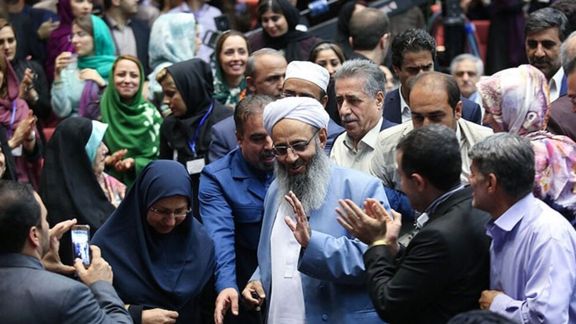
Molavi Abdolhamid, officially known as Sheikh Abdolhamdid Esmailzehi, is the most prominent religious leader of Iran's largely Sunni Baluch population living in the province. Abdolhamid's popularity is largely because of his willingness to challenge the absolute authority of Supreme Leader Ali Khamenei. Earlier in November, the outspoken Sunni Imam said women, ethnic and religious groups, and minorities have faced discrimination after the establishment of the Islamic Republic in 1979. He was also brave enough to blame Khamenei for the attack on protesters in his hometown, Zahedan, known as the Bloody Friday. It took place September 30, when security forces killed about 100 people, and injured hundreds. Earlier in the month, he called for an internationally monitored referendum, saying by killing and suppression the government cannot push back a nation.
The statement by the Sunni clergymen came a day after an audio file was leaked by the hacktivist group Black Reward, revealing the Islamic Republic’s plan to tarnish Abdolhamid’s reputation. The audio tape from a meeting between a Revolutionary Guard general and a group of media managers or representatives from outfits affiliated with the IRGC, revealed that Khamenei demanded Mowlavi Abdolhamid be warned over his comments. Qasem Qoreyshi, the deputy commander of IRGC’s paramilitary Basij forces, also said in the meeting that “We made a mistake about Abdolhamid. We first eliminated tribal leaders in the region to give more credit to Abdolhamid. However, he didn’t carry much weight [in the past].”
In a similar joint video statement released earlier in the month, Sunni religious leaders and Friday prayer Imams in Iran’s Kordestan province also called for a referendum under the supervision of international bodies. The Sunni clerics of Sanandaj and Dehgolan called for a plebiscite with the presence of religious and national leaders, as well as neutral international observers to “get out of the current situation.”
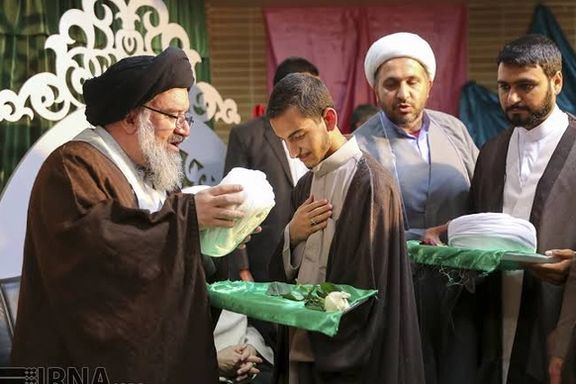
Mohammad Reza Moballeghi, an Iranian lawmaker, says some clerics no longer wear their robe and turban in public fearing disrespectful acts by random individuals.
Clerics in Iran are among the most privileged groups in society and benefit from many financial and other advantages although a majority of them have minimal educational and almost no work expertise. Among other things, they are exempted from the compulsory two-year military service and unlike other students who have to pay hefty tuition fees, clerical students in Iran get paid for studying in seminaries.
As Iran's biggest protests against the Islamic Republic and clerical rule has been raging on for more than 70 days, turban-tossing has become increasingly a way of taking on the clerics who are blamed for economic failures of the theocratic government and violations of human rights in Iran.
Turban-tossing has turned to s port for young people who approach a cleric in the street and fling the turban off his head. Influential clerics with links to the government rarely walk in the streets and are usually escorted by bodyguards.
Moballeghi, himself a cleric, speaking in parliament Monday said that "During the past two months the people's attitude toward clerics has changed for worse as there is a lot of propaganda against clerics."
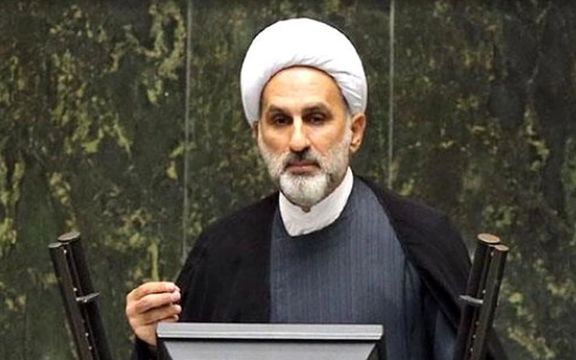
Fearing disrespect by the "new revolutionaries" in Iran, according to Moballeghi, many clerics prefer to appear in public in normal, secular outfit. Meanwhile, Moballegi claimed that the robe and turban that Iranian clerics put on follows the model of the outfit worn by Prophet Mohammad. Others, including some clerics say that the prophet dressed like everybody else. At the time everyone was wearing a robe.
Earlier, another cleric in parliament, Mohammad Taghi Naghdali warned that those who toss turbans “are playing with the lion's tail and they should know that they will be punished for that." Earlier, Judiciary Chief Gholamhossein Mohseni Ejei had warned them that their "rude behavior will not remain unpunished."
He was right, as the government-owned newspaper Iran reported on Monday that at least two young men have been arrested in Tehran and Babol for turban tossing. Some videos on social media show young women also tossing turbans in the streets before running away.
Opposition to Shiite clerics has been a characteristic of what is now called the" new Iranian revolution." One of the main slogans heard in Iranian cities these days is "Mullahs should get lost."
As a result of many years of discrimination by the clerical government, Iranians have been taking on the clerics during recent protests. In a couple of cities including Qom, protesters have set fire to seminaries.
While many young Iranians are unemployed because of the country's chronic economic crisis, almost every Iranian cleric has some sort of a job at various ministries such as education, justice or Culture and Islamic Guidance. Many other government offices and military organizations in Iran have "ideological departments" led and run by clerics who know nothing about how those organizations operate.
During the protests in the past two months very few Iranian clerics have shown any sympathy with the protesters. On the contrary, many, particularly those at the parliament, or Friday Prayer Imams have called for severely punishing protesters.

Many countries and international organizations have voiced support for protests in Iran by adopting resolutions and issuing condemnations of government violence, but people wonder about tangible actions.
Many countries and international organizations have voiced support for protests in Iran by adopting resolutions and issuing condemnations of government violence, but people wonder about tangible actions.
The United States Monday circulated a draft resolution on a measure to expel the Islamic Republic from the UN Commission on the Status of Women. The measure to remove Iran from the women's equality and empowerment body is scheduled to be voted on December 14.
The Islamic Republic has just started a four-year term on the 45-member commission, which meets annually every March.
The document also denounces Iran's policies as "flagrantly contrary to the human rights of women and girls and to the mandate of the Commission on the Status of Women." Canada, New Zealand, Netherlands and the United States are behind the push.
The resolution would "remove with immediate effect the Islamic Republic of Iran from the Commission on the Status of Women for the remainder of its 2022-2026 term."
"The US and others have been actively working the phones to garner support to remove Iran from the UN Commission on the Status of Women," said a UN diplomat, speaking on condition of anonymity to Reuters. "It seems like they're making traction – including with some initially hesitant countries."
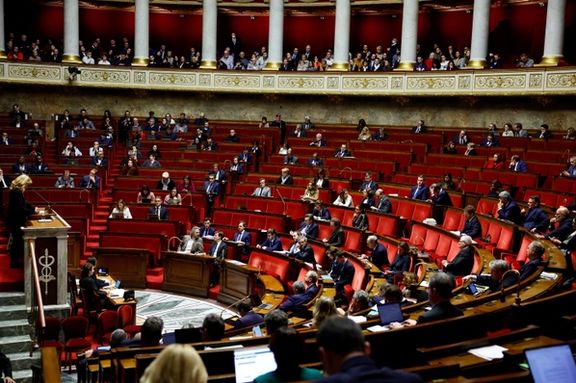
Also on Monday, the French National Assembly unanimously adopted a resolution offering "support for the Iranian people" and condemning the restriction of women's freedoms and rights. This comes ahead of another meeting of EU foreign ministers to discuss new sanctions over the crackdown on protesters.
President Emmanuel Macron's Renaissance party deputy Hadrien Ghomi, himself a descendant of Iranian immigrants, said the 149 votes in favor of the motion in the National Assembly "sent a strong message" to the world. The resolution condemns in the "strongest terms the brutal and widespread repression" against "non-violent demonstrators".
French Foreign Minister Catherine Colonna said that the situation "requires action, with responsibility", adding that after two packages of sanctions already imposed at a European level, new sanctions are being prepared for the next Council of Foreign Ministers on 12 December.
But many Iranians ask if statements and resolutions are enough to pressure the theocratic regime in Tehran. More forceful steps, such as closing all European embassies in Iran or imposing more sanction to directly pressure the ruling elite are possible additional measures people mention in their social media posts.
These all came after the Geneva-based UN Rights Council last week voted to appoint an independent investigation into the Islamic Republic's deadly repression of protests, passing the motion to cheers of activists. Accused Western states of using the council to target Iran in an "appalling and disgraceful" move, Tehran said Monday that it will reject the investigation into the country's repression of antigovernment protests, like it refused to cooperate with UN human rights rapporteurs for 30 years.
Some Iranian officials have started to acknowledge some of its atrocities with Revolutionary Guards general Amirali Hajizadeh saying Tuesday that more than 300 people have been killed in the protests, acknowledging that innocent people have also been killed.
"Everyone in the country has been affected by the death of this lady [Amini]. I don't have the latest figures, but I think we have had perhaps more than 300 martyrs and people killed in this country, including children, since this incident," said Hajizadeh, head of the Guards' aerospace division.
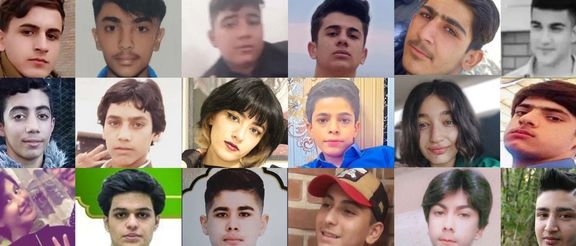
The number of young and underage protesters killed in Iran’s nationwide uprising by government security forces continues to increase.
Based on reports received by Iran International, Mohammad Hossein Kamandlou, 17, was killed on November 22 in Moshiriyeh neighborhood of Tehran and his funeral took place under strict security measures.
Activists say Arshiya Imamqolizadeh Alamdari, 16, who was detained for 10 days and charged for grabbing and tossing the turban of a cleric in Jolfa in East Azarbaijan, committed suicide just two days after being released.
Reports have also indicated that Maedeh (Mahak) Hashemi, 16, was killed by batons strikes in Shiraz Thursday, and her body was buried in the presence of security forces.
An human rights organization Hengaw based abroad reported that Reza Kazemi, 16, from Kamyaran in Kordestan province succumbed to injuries he received when security forces shot him during protests.
Masoud Dolatshahi, 38, who was shot in the chest in the Saadat Abad neighborhood of Tehran on November 20, also died on Monday.
Meanwhile, Mohammad Jaafar Ghaempanah, a cornea specialist, said in a video that hundreds of protesters have lost their eyes due to being hit by pellets from shotguns used by police and plainclothesmen.
On Friday, 140 ophthalmologists in a letter to the head of the Iranian Ophthalmology Association warned that many citizens have lost their vision by pellets and paintballs.
Previously, Jalal Mahmoodzadeh, an MP, said at least 105 people have been killed in Kurdish regions in the past month based on unofficial reports.

Iran and the US are set for their clash on the soccer pitch with both at the risk of elimination from the 2022 Qatar World Cup, one of the most contentious in history.
The final of Group B – the most politically charged group at this year's tournament – is set to be held on Tuesday night. Iran won its previous match against 10-man Wales 2-0 after its humiliating 6-2 loss against England. The Americans, however, displayed a stable performance in their two earlier matches that ended with a goalless draw against England and a 1-1 tie with Wales.
The Iranian squad – nicknamed Team Melli – needs at least a draw to book a berth for the knockout stage but the Yanks must defeat Iran if they want to keep their hopes alive in the competitions. However, Team Melli players are between a rock and a hard place as many Iranians believe the so-called national team does not represent the nation and is only a propaganda tool for the ruling Islamic regime.
One of the controversial issues is whether or not Team Melli would sing along with the Islamic Republic anthem. The players remained silent during their opener against England but after the match, people’s reactions on social media and streets indicated that the gesture was not enough to forgive the players, who have lost popularity due to their lack of support for the current wave of popular protests. In their second match, the players sang along with the anthem and even celebrated boisterously after scoring goals and winning the match, setting the ground for the world to witness the rift in Iranian society.
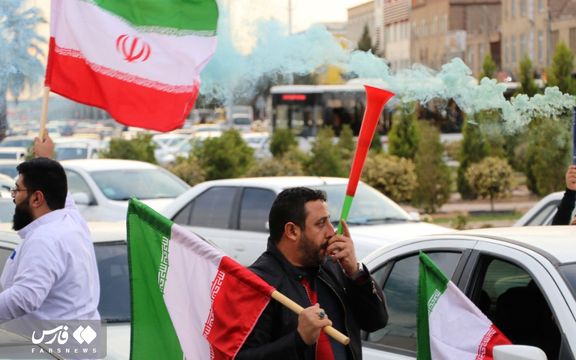
Most Iranians were filled with mixed emotions following the match against Wales. Until recently, whenever Team Melli managed to defeat another country, people would pour into streets and celebrate as security forces were watching and waiting for them to start chanting antigovernment slogans, so they would intervene and disperse the crowd. This time was different. Security forces – some of whom were killing the antigovernment protesters since September – seemed to have been ordered to celebrate and dance on streets, creating some of the most surreal scenes in large cities. The regime had managed to make the players so distant from the people that an event – which historically tends to morph into an antigovernment rally – turned into a show of public satisfaction for the regime.
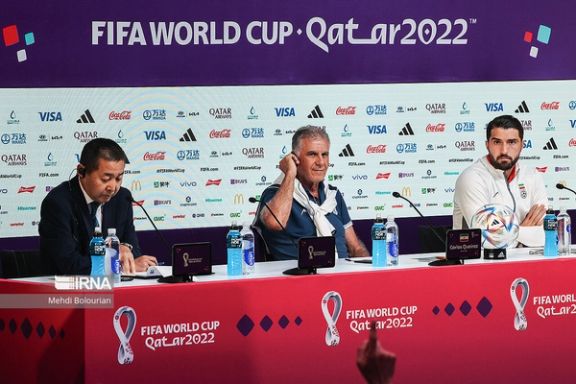
It did not take long until documents and audio footage were leaked online that proved people’s conjectures were actually right. The hacktivist group Black Reward got access to Fars news agency, affiliated with the country’s Revolutionary Guards, and released documents that showed the Islamic Republic had taken numerous measures to make the best use of the World Cup opportunity in Qatar. They had done everything they could think of for a good show in support of the Islamic Republic: from giving free tickets to over 6,000 of their apparatchiks to attend the matches; collaborating with Qatari officials to get the list of people who had bought tickets, and ensuring that Team Melli’s coach Carlos Queiroz would cooperate with them in their plans. They even pulled some strings to make sure that Iran International reporters were not allowed in Qatar.
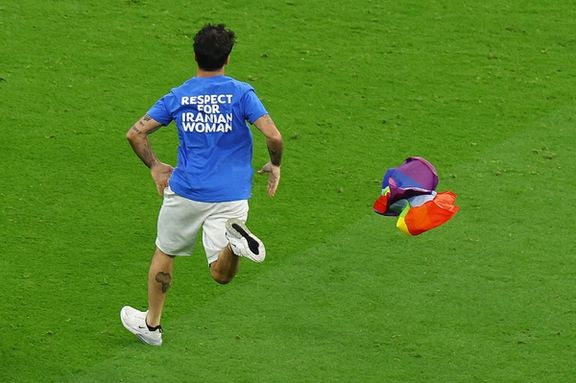
Citing a source involved in the security of the games, CNN reported Monday that even the families of Team Melli players have been threatened with imprisonment and torture if the players fail to “behave” ahead of the match against the USA. The source added that the players were called to a meeting with members of the Revolutionary Guard (IRGC), saying that they were told their families would face “violence and torture” if they did not sing the anthem or if they show any act of protest against the Tehran regime.
Sunday night, Iran’s President Ebrahim Raisi also held a phone conversation with Qatari Emir Tamim bin Hamad Al Thani and football was not mentioned in official reports about the call, but for many Iranians something must have been discussed.